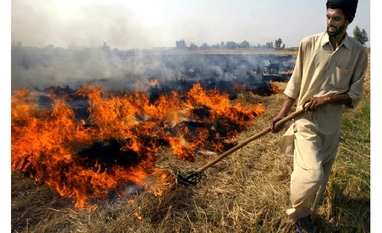Farmers outside India’s capital have started to burn the post-harvest straw from their fields, heralding the onset of north India’s toxic-air season. Stopping the burning of such straw, or stubble, and other biomass could improve air quality in Delhi by 90%, according to a 2016 apportionment study by the Indian Institute of Technology, Kanpur.
Stubble burning was banned in 2015 by the National Green Tribunal (NGT), India’s apex court on matters concerning the environment.
While the NGT asked Punjab, Haryana, Delhi, Rajasthan & UP to enforce the ban on agriculture crop-residue burning in 2015 (with fines ranging from Rs 2,500 for landowners, with less than two acres, to Rs 15,000 for farmers with over five acres, per incident of crop burning) the burn continues.
To change that, on October 13, the NGT ordered Punjab, Uttar Pradesh and Haryana to name biomass energy plants and other industries that could use crop residue as fuel and asked these states to ensure farmers got equipment to remove stubble at low or no cost depending on their financial and land owning capacity.
We storified a thread of tweets put out on October 16, 2017, to tell you how the stubble-burn affects the air over Delhi.
(Patil is an analyst with IndiaSpend.)
To read the full story, Subscribe Now at just Rs 249 a month
Already a subscriber? Log in
Subscribe To BS Premium
₹249
Renews automatically
₹1699₹1999
Opt for auto renewal and save Rs. 300 Renews automatically
₹1999
What you get on BS Premium?
-
Unlock 30+ premium stories daily hand-picked by our editors, across devices on browser and app.
-
Pick your 5 favourite companies, get a daily email with all news updates on them.
Full access to our intuitive epaper - clip, save, share articles from any device; newspaper archives from 2006.
Preferential invites to Business Standard events.
Curated newsletters on markets, personal finance, policy & politics, start-ups, technology, and more.
Need More Information - write to us at assist@bsmail.in
)